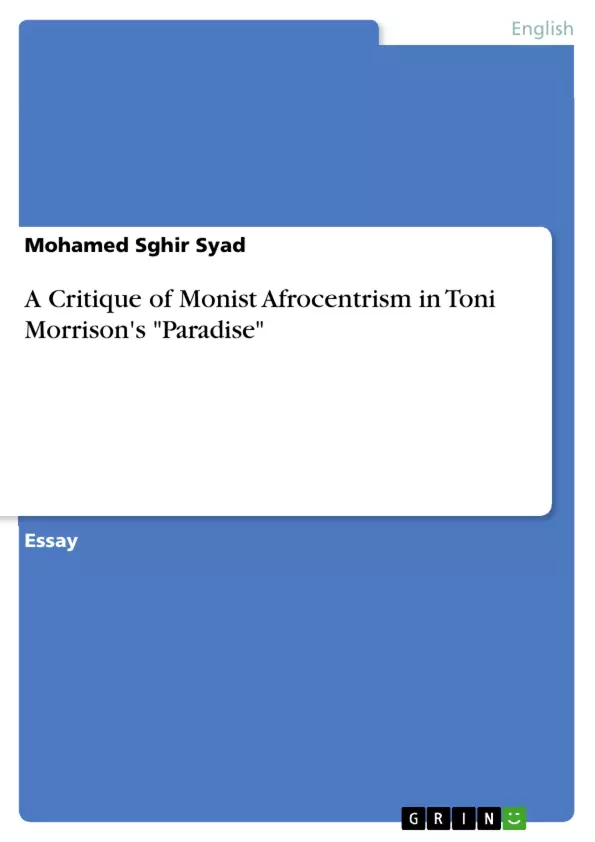In rewriting her people’s history in "Paradise", Morrison touches upon the issue of Afrocentrism as a cornerstone in the social, political and cultural understanding of black America. Her steadfast interest in black peoples’ lives and destinies may be read as a self-evident concern with Afrocentrism. Both her literary art and cultural criticism overlap, in one way or another, with moderate forms of Afrocentrism.
First coined by W.E.B. Du Bois in the early 1960s then popularised by Asante a couple of decades later, the term Afrocentrism represents a talking back against the hegemonic attitudes and discourses that have been disfiguring and marginalising the African Americans’ cultural legacies and historical realities both before and after the Transatlantic Passage.
Table of Contents
- A Critique of Monist Afrocentrism in Toni Morrison's Paradise (1998)
- Afrocentrism and the Rehabilitation of Africans and African Americans
- Paradise and Afrocentrism
- Black Power and the Rise of Afrocentrism
- Morrison's Critique of Strong Afrocentrism
- The Rubyites and the Limitation of Tradition
- Patricia Best and Reverend Misner: Different Attitudes Toward Afrocentrism
Objectives and Key Themes
This essay examines the role of Afrocentrism in Toni Morrison's novel Paradise (1998). It analyzes how Morrison utilizes the concept of Afrocentrism to explore the social, political, and cultural complexities of black America in the post-Civil Rights era. The essay specifically focuses on Morrison's critique of strong or "wild" Afrocentrism, as exemplified by the Rubyites, a community of African American men who seek to create a utopian society based on a strict interpretation of African values and traditions.
- Afrocentrism as a response to cultural racism and the marginalization of African American history
- The limitations of strong Afrocentrism and its potential for exclusion and ethnocentrism
- The importance of recognizing the diversity within African American communities
- The role of tradition and history in shaping identity and community
- The tension between the desire for self-determination and the need for integration
Chapter Summaries
- The essay begins by introducing the concept of Afrocentrism and its historical context, highlighting its origins in the response to racist stereotypes and the need to reclaim African American cultural heritage.
- The essay then explores how Morrison uses Afrocentrism as a central theme in Paradise, examining the novel's depiction of the Rubyites and their attempt to create a community based on African values and traditions.
- The essay analyzes Morrison's critique of strong Afrocentrism, highlighting the dangers of exclusionism and the need for a more nuanced understanding of African American identity and history.
- The essay examines the role of tradition and history in shaping the Rubyites' community, highlighting their reliance on the past and their resistance to change.
- The essay concludes by exploring the different perspectives on Afrocentrism held by the characters of Patricia Best and Reverend Misner, highlighting the tension between the desire for self-determination and the need for integration.
Keywords
This essay explores the themes of Afrocentrism, cultural racism, black identity, tradition, history, community, exclusion, and integration in Toni Morrison's novel Paradise. It examines the limitations of strong Afrocentrism and its potential for ethnocentrism, while also highlighting the importance of recognizing the diversity within African American communities. The essay draws on the work of key figures in the Afrocentric movement, including W.E.B. Du Bois, Molefi Kete Asante, and Stephen Howe, to analyze Morrison's complex and nuanced portrayal of Afrocentrism in the novel.
Frequently Asked Questions
What is the main focus of the essay on Toni Morrison's "Paradise"?
The essay examines the role of Afrocentrism in the novel, specifically critiquing "monist" or "strong" Afrocentrism as practiced by the community of Ruby.
How does Morrison define Afrocentrism in her work?
Afrocentrism is presented as a response to cultural racism and the marginalization of African American history, acting as a way to reclaim and rehabilitate cultural legacies.
What are the dangers of "strong" Afrocentrism according to the analysis?
The essay argues that strong Afrocentrism can lead to exclusionism, ethnocentrism, and a rigid reliance on tradition that prevents necessary social change and integration.
Who are the key figures in the Afrocentric movement mentioned?
The analysis draws on the work of W.E.B. Du Bois, who coined the term, as well as Molefi Kete Asante and Stephen Howe.
How do the characters Patricia Best and Reverend Misner differ in their views?
They represent different attitudes toward Afrocentrism, highlighting the tension between the desire for total self-determination (exclusion) and the reality of needing integration and recognizing diversity.
- Quote paper
- Mohamed Sghir Syad (Author), 2015, A Critique of Monist Afrocentrism in Toni Morrison's "Paradise", Munich, GRIN Verlag, https://www.grin.com/document/322691



